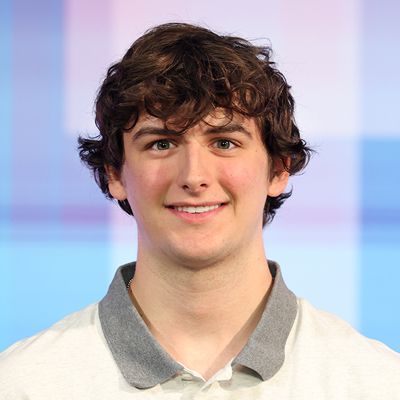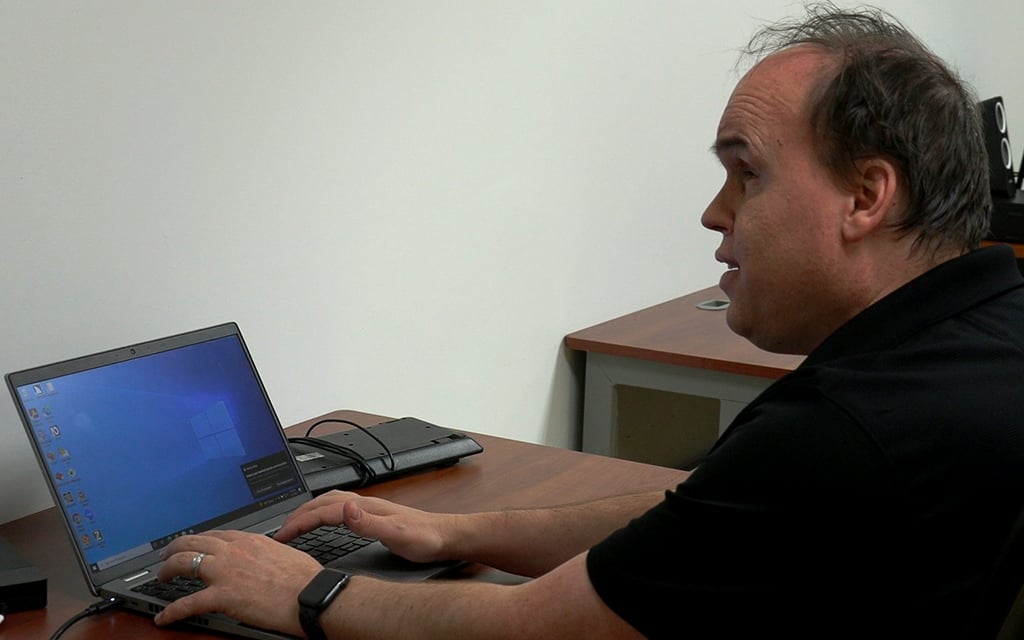
Saavi assistive technology instructor Joe Good demonstrates technology on Nov. 1 that helps the visually impaired use a computer. (Photo by Sydney Witte/Cronkite News)
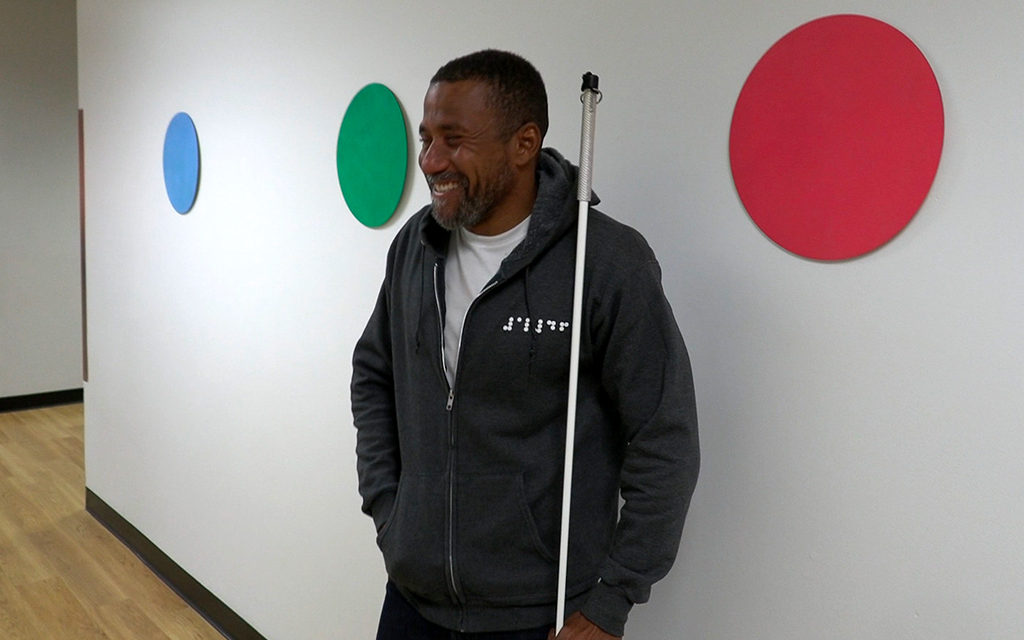
Garry Fowlkes, a Saavi student, in the Saavi Phoenix Center on Nov. 1. (Photo by Sydney Witte/Cronkite News)
PHOENIX – Sending an email, cooking a meal and navigating the internet are activities people might take for granted, but some people need special training in order to perform these tasks. Saavi Services for the Blind teaches people who are visually impaired or blind how to do many activities that enable them to live independently.
Garry Fowlkes, 45, a recent graduate of Saavi, said “it gave me back a life.” Fowlkes, whose vision had been deteriorating for decades. had to have cataract surgery when he was in eighth grade. He said that until Saavi, “I was throwing a very lavish pity party.”
According to the National Federation of the Blind Arizona, over 175,000 people in the state are reported to be blind. To be legally classified as visually impaired, vision must be 20/70, which means that a person must be within 20 feet to see an object that a person with 20/20 vision could normally see at 70 feet. To be considered legally blind, a person must have 20/200 or worse.
Jordan Moon, the director of the Phoenix center of Saavi Services for the Blind, said the individuals at the facility prefer to be identified as blind. “It’s not what you can see that matters, it’s what you can do,” Moon said.
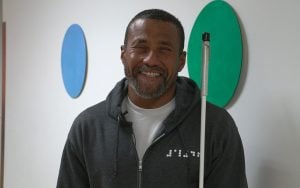
Garry Fowlkes talking about his experience as a student at Saavi, on Nov. 1. (Photo by Sydney Witte/Cronkite News)
Saavi – which stands for Southern Arizona Association for the Visually Impaired – was founded in Tucson in 1964 as a social club for visually impaired individuals and expanded to a Phoenix location in 2012. Both locations teach skills to youth, adults and seniors that emphasize the ability to lead an independent lifestyle. The centers offer general core classes, such as Braille and cane travel, and programs in job readiness and assistive technology.
Assistive technology programs include training in computer navigation, typing structure and screen reading, which enables a blind person to read what’s on the screen using speech or Braille. Students learn to use computer key commands to successfully navigate the internet and common programs such as Word and Excel.
According to a 2021 survey from the Cornell University Institute on Employment and Disability, only 48.1% of adults ages 18 – 64 with a visual disability are employed nationwide. In Arizona, 57.1% of adults with a visual disability are employed.
In order for adults to join Saavi’s comprehensive blindness training program, they must be a client of the Arizona Vocational Rehabilitation program, request blind skill training services and be actively wanting to find a job. Moon said Saavi currently has about 10 adult students and several on the waiting list. He estimates that the organization has helped over 1,000 blind people in Arizona.
Fowlkes was introduced to Saavi through the Vocational Rehabilitation program. The goal of the program is to make students more employable. “By the end of their program, they’re like ‘Hey, I just applied for a job and got it!’ so it’s a great feeling,” said Joe Good, the instructor for the assistive technology program.
“We teach students the foundation of whatever skill that they’re trying to learn. And then we find ways that they can take that skill and apply it in a new way,” Moon said.
After taking high doses of the steroid prednisone for many years to combat severe asthma, Fowlkes says he became completely blind in 2003. Now, after 20 years of inconsistent employment, he is learning a new profession. Fowlkes says that he wants to learn web accessibility to work with the foreign exchange market and currency trading. With training in assistive technology, he is learning how to trade on different stock and currency markets using the screen readers and key commands.
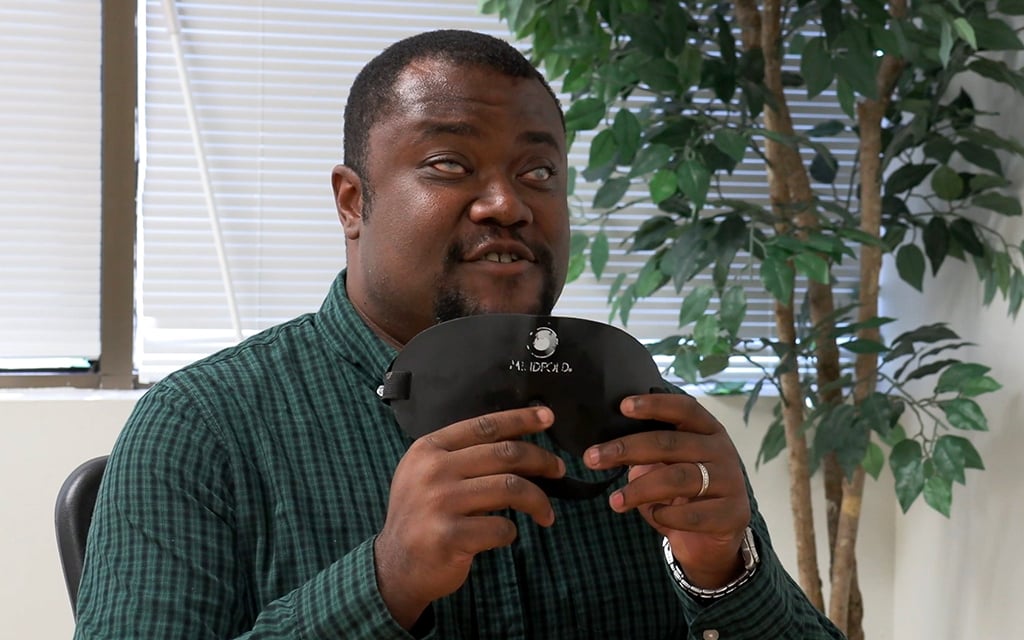
Saavi Phoenix Director Jordan Moon holding up a mask used to equalize students’ vision abilities, on Nov. 1. (Photo by Sydney Witte/Cronkite News)
The job readiness program helps students identify their goals, interests and hobbies and use them to create a career path. Christopher Ashman, who teaches job readiness, works with the students over a 16-week period and up to 90 days post graduation. “We discuss different topics such as first impressions, how to create a cover letter, how to write a resume, hard and soft skills,” he said. “Afterwards we do job readiness, job placement and development.”
Ashman says he and other Saavi instructors continue to work with students and their employers to ensure the students keep their jobs. This can include requesting accommodations in order to be successful.
“A lot of times people will believe that they can’t do anything on the computer because of blindness and we’re here to basically teach, yes, you can do that,” Good said. “You can absolutely be successful in any area you want to go into, whether it’s tech or running a business for yourself, any job that you have deals with technology.”
“What I’m hopeful for is to live! There’s a few times that I may get frustrated that I’m blind, but for the most part, I just try to figure it out anyways,” Fowlkes said. “I’m hopeful to be a successful businessman who owns his own business and is able to give back, be a good father, be a good friend.”
In his efforts to make a positive impact, Fowlkes is producing a podcast, Mirror On The Wall, focused on “overcoming a hopeless state of mind.”
